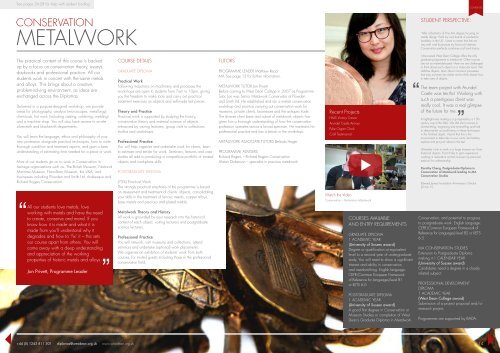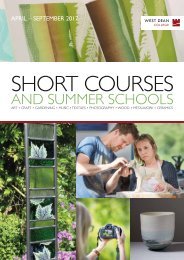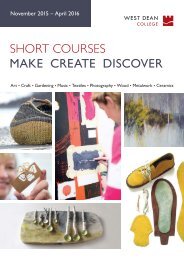1DSkBaK
1DSkBaK
1DSkBaK
You also want an ePaper? Increase the reach of your titles
YUMPU automatically turns print PDFs into web optimized ePapers that Google loves.
See pages 26-28 for help with student funding<br />
CONSERVATION<br />
METALWORK<br />
STUDENT PERSPECTIVE:<br />
CONTENTS<br />
“After a Bachelor of Fine Arts degree focusing on<br />
metals design I had my own brand of production<br />
jewellery in the US. I want a career that lets me<br />
stay with craft but pursue my historical interests.<br />
Conservation perfectly combines craft and history.<br />
The practical content of this course is backed<br />
up by a focus on conservation theory, essays,<br />
daybooks and professional practice. All our<br />
students work in concert with the same metals<br />
and alloys. This brings about a creative,<br />
problem-solving environment, as ideas are<br />
exchanged across the Diplomas.<br />
Delivered in a purpose-designed workshop, we provide<br />
areas for photography, analysis (microscopes, metallurgy),<br />
chemicals, hot work (including casting, soldering, welding)<br />
and a machine shop. You will also have access to on-site<br />
silversmith and blacksmith departments.<br />
You will learn the language, ethics and philosophy of your<br />
new profession alongside practical techniques, how to write<br />
thorough condition and treatment reports, and gain a keen<br />
understanding of estimating time needed for a piece of work.<br />
Most of our students go on to work in Conservation in<br />
heritage organisations such as: The British Museum, National<br />
Maritime Museum, Fitzwilliam Museum, the V&A, and<br />
businesses including Plowden and Smith Ltd, Arabesque and<br />
Richard Rogers Conservation.<br />
All our students love metals, love<br />
working with metals and have the need<br />
to create, conserve and mend. If you<br />
know how it is made and what it is<br />
made from you’ll understand why it<br />
degrades and how to ‘fix’ it – this sets<br />
our course apart from others. You will<br />
come away with a deep understanding<br />
and appreciation of the working<br />
properties of historic metals and alloys.<br />
Jon Privett, Programme Leader<br />
COURSE DETAILS<br />
GRADUATE DIPLOMA<br />
Practical Work<br />
Following inductions on machinery and processes the<br />
workshops are open to students from 7am to 10pm, giving<br />
you the freedom to make tools and carry out practical<br />
treatment exercises on objects and self-made test pieces.<br />
Theory and Practice<br />
Practical work is supported by studying the history,<br />
conservation theory and material science of objects,<br />
enhanced by visiting lecturers, group visits to collections,<br />
studios and workshops.<br />
Professional Practice<br />
You will help organise and undertake work for clients, learn<br />
to estimate and tender for work. Seminars, lectures and case<br />
studies all add to producing a competitive portfolio of treated<br />
objects and workplace skills.<br />
POSTGRADUATE DIPLOMA<br />
(75%) Practical Work<br />
The strongly practical emphasis of the programme is based<br />
on assessment and treatment of clients’ objects, consolidating<br />
your skills in the treatment of ferrous metals, copper alloys,<br />
base metals and precious and plated metals.<br />
Metalwork Theory and History<br />
All work is grounded by your research into the historical<br />
context of each object, visiting lecturers and postgraduate<br />
science lecturers.<br />
Professional Practice<br />
You will network, visit museums and collections, attend<br />
seminars and undertake (optional) work placements.<br />
We organise an exhibition of students’ work from both<br />
courses, for invited guests including those in the professional<br />
conservation field.<br />
TUTORS<br />
PROGRAMME LEADER Matthew Read<br />
MA See page 12 for further information.<br />
METALWORK TUTOR Jon Privett<br />
Before coming to West Dean College in 2007 as Programme<br />
Tutor, Jon was Senior Metalwork Conservator at Plowden<br />
and Smith Ltd. He established and ran a metals conservation<br />
workshop and practice carrying out conservation work for<br />
museums, private clients, businesses and the antiques trade.<br />
The diverse client base and nature of metalwork objects has<br />
given him a thorough understanding of how the conservation<br />
profession operates across a broad spectrum. He maintains his<br />
professional practice and has a bench in the workshop.<br />
METALWORK ASSOCIATE TUTORS Belinda Hager<br />
PROGRAMME ADVISERS<br />
Richard Rogers – Richard Rogers Conservation<br />
Alistair Dickenson – specialist in precious metalwork<br />
Recent Projects<br />
HMS Victory Canon<br />
Arundel Castle Armour<br />
Pyke Organ Clock<br />
Croll Testimonial<br />
Watch the Video<br />
Conservation – Restoration Metalwork<br />
COURSES AVAILABLE<br />
AND ENTRY REQUIREMENTS<br />
GRADUATE DIPLOMA<br />
1 ACADEMIC YEAR<br />
(University of Sussex award)<br />
Degree or qualification at equivalent<br />
level to a second year of undergraduate<br />
study. You will need to show a significant<br />
interest and ability in conservation<br />
and metalsmithing. English language:<br />
CEFR (Common European Framework<br />
of Reference for Languages) level B1<br />
or ILETS 6.0<br />
POSTGRADUATE DIPLOMA<br />
1 ACADEMIC YEAR<br />
(University of Sussex award)<br />
A good first degree in Conservation or<br />
Museum Studies or completion of West<br />
Dean’s Graduate Diploma in Metalwork<br />
I discovered West Dean College offers the only<br />
graduate programme in metalwork. Other courses<br />
are not as materials-based. Here we are challenged<br />
to think about each object on a molecular level. We<br />
stabilise objects, learn about corrosion processes<br />
that may not even be visible and to think ahead how<br />
to take care of objects.<br />
The team project with Arundel<br />
Castle was terrific! Working with<br />
such a prestigious client was<br />
really cool. It was a real glimpse<br />
of the future for me.<br />
A highlight was making a cup inspired by a 15th<br />
century cup in the V&A. We did short courses in<br />
silversmithing, engraving and enamelling and had<br />
to demonstrate our proficiency in these techniques<br />
in the finished object. I learnt that this is the<br />
environment to take risks in your work, be fearless,<br />
explore and put your ideas to the test.<br />
Ultimately I aim to work in a large museum as I love<br />
historical objects. First I’d like to gain experience<br />
working in restoration as that answers my personal<br />
passion for craftsmanship.<br />
Dorothy Cheng, Postgraduate Diploma in<br />
Conservation of Metalwork leading to MA<br />
Conservation Studies<br />
Edward James Foundation Anniversary Scholar<br />
2014–15<br />
Conservation, and potential to progress<br />
to postgraduate work. English Language:<br />
CEFR (Common European Framework of<br />
Reference for Languages) level B2 or ILETS<br />
6.5<br />
MA CONSERVATION STUDIES<br />
Extension to Postgraduate Diploma<br />
making it 1 CALENDAR YEAR<br />
(University of Sussex award)<br />
Candidates need a degree in a closely<br />
related subject.<br />
PROFESSIONAL DEVELOPMENT<br />
DIPLOMA<br />
1 ACADEMIC YEAR<br />
(West Dean College award)<br />
Submission of a project proposal and/or<br />
research project.<br />
Programmes are supported by BADA.<br />
+44 (0) 1243 811 301 diplomas@westdean.org.uk www.westdean.org.uk 14




